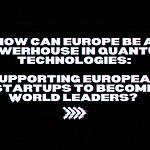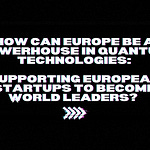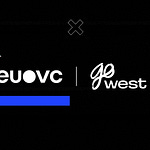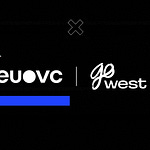In today’s episode of The European VC, Andreas talks with Shmuel Chafets, co-founder and Partner at Target Global, one of Europe’s leading venture firms with investments spanning software, fintech, mobility, logistics, healthcare, and consumer internet. With over 140 portfolio companies, including Revolut, Delivery Hero, and TravelPerk, Target Global operates across Europe, Israel, the Middle East, and Africa, backing founders from early-stage to growth. Known for its pragmatic approach to investing, the firm is increasingly focused on AI-native startups and frontier technologies shaping the next decade.
Since launching Target Global a decade ago, Shmuel has been at the forefront of European venture investing, navigating market cycles and shifting investment strategies in response to macro and technological trends. In this conversation, he shares his candid views on Europe's lagging position in AI, why Europe must shift from a risk-averse mindset to a creator-driven economy, and how AI is set to disrupt everything from public services to vertical SaaS. We also dive into why Target Global is moving earlier in its investment strategy, the growing relevance of Israel and the UAE in global tech, and why European bureaucracy remains one of the biggest obstacles to innovation.
Watch it here or add it to your episodes on Apple or Spotify 🎧 chapters for easy navigation available on the Spotify/Apple episode.
Embark on a Journey of Deep Inner Work
Join us for a transformative experience of self-discovery and vulnerability, guided by Rupda and supported by a trusted group of peers. Through embodied practices and self-inquiry, we will build resilience, presence, and a supportive network of fellow investors and founders for meaningful growth. Let’s walk each other home.
✍️ Show notes
1. Europe’s Current Position and Challenges
Europe is currently facing stagnation and a lack of decisive leadership, which has left it trailing behind in technological and economic progress. Unlike the U.S., where political and business landscapes evolve rapidly, Europe remains slow-moving and overly bureaucratic. The European Union struggles to pool resources effectively, which prevents it from making the kind of large-scale investments needed to compete globally. This lack of agility is particularly evident in AI and emerging technologies, where Europe’s regulatory-heavy approach often stifles innovation before it can take off.
To catch up, Europe needs a fundamental shift in mindset, moving away from risk-averse policies toward a more dynamic, opportunity-driven approach. The current system prioritizes downside protection, ensuring compliance and stability rather than fostering bold investments. While this has helped maintain economic and political security, it has also created an environment where game-changing companies and technologies struggle to emerge. Without structural reforms and a focus on incentivizing risk-taking, Europe risks falling even further behind in global innovation.
2. AI and the Future of Europe
AI presents an enormous economic and technological opportunity, but Europe’s focus on regulatory control over innovation is limiting its potential. The dominant conversation in European policy circles revolves around GDPR compliance, job displacement, and risk mitigation rather than on how AI can drive productivity and economic growth. This contrasts sharply with the U.S., where AI development is fast-tracked with massive investments, and discussions focus on competitive advantage rather than just compliance. Without a shift towards an innovation-friendly framework, Europe risks missing out on AI’s economic benefits while still dealing with its challenges.
However, AI’s transformative power is undeniable, and Europe must rethink its approach to ensure that AI adoption leads to economic gains rather than just regulatory constraints. AI has the potential to address some of Europe’s biggest problems, such as low productivity, an aging workforce, and rising costs in public services. By focusing on AI’s ability to boost efficiency in industries like healthcare, education, and law enforcement, Europe can harness its potential to create jobs, improve services, and enhance competitiveness—if it can overcome its self-imposed regulatory roadblocks.
3. AI in Frontline Services (Public Sector)
AI’s biggest untapped potential in Europe lies in frontline services—teachers, police officers, and nurses—where automation could significantly improve efficiency. Today, these workers spend hours on bureaucratic tasks, such as filling out reports and entering data, which AI could easily automate. Police forces in the UK, for example, already use AI in areas like fraud detection, whereas teachers remain the most hesitant to adopt it. By leveraging AI to handle administrative work, frontline workers could dedicate more time to their core duties, such as teaching, patrolling, and providing patient care.
Despite these advantages, AI adoption in Europe’s public sector is still limited, largely due to regulatory concerns, including GDPR and data privacy laws. Many public institutions resist AI implementation out of fear that compliance issues will create legal liabilities. However, this reluctance prevents much-needed improvements in efficiency and service delivery. If governments focused on creating clear, practical AI guidelines instead of blanket restrictions, they could enable frontline workers to use AI effectively while maintaining privacy and security standards.
4. Challenges in AI Adoption for Public Services
One of the biggest hurdles to AI adoption in Europe’s public sector is the "build rather than buy" mentality, where governments attempt to develop their own AI infrastructure instead of leveraging existing commercial solutions. This approach is not only inefficient but also unrealistic given the scale of investment required. Unlike the U.S., where private companies drive AI advancements, European governments often attempt to create centralized AI systems, which are slow to develop and lack the flexibility to meet rapidly changing needs.
Additionally, the lack of AI expertise within public institutions further slows adoption. Unlike the private sector, where companies hire engineers and AI specialists, most government agencies lack the talent to integrate AI effectively. A more practical approach would be to adopt commercially available AI solutions with localized customizations rather than trying to develop AI from scratch. This would allow institutions like hospitals, schools, and law enforcement agencies to gradually experiment with AI in a controlled, secure manner while accelerating adoption.
5. Investability of AI in Frontline Services
While AI in frontline services presents clear opportunities, it has not been a primary focus for investors like Target Global. The concern is that highly specialized AI applications targeting teachers, nurses, or police officers might struggle to scale. Instead, the real opportunity may lie in broader AI platforms that can be adapted across multiple industries. AI-native companies that provide flexible, customizable solutions are more likely to succeed than those focused on narrow, niche applications.
Another key concern is the changing dynamics of software investment in an AI-driven world. Traditional Vertical SaaS (software built for specific industries) is becoming increasingly vulnerable, as many of its functions can now be replicated using general-purpose AI models. This shift means that investors must be cautious about backing startups that offer single-use AI tools, as larger AI models could easily make them obsolete. The key to investability will be supporting AI platforms that allow for widespread customization rather than narrow, rigid applications.
6. The Shift in Venture Investing Strategy
Target Global has shifted its investment strategy towards earlier-stage startups, particularly AI-native companies. This change reflects the realization that AI is fundamentally altering the software landscape, making it riskier to invest in later-stage startups that are not built with AI from the ground up. At the pre-seed and seed stage, founders can still design their companies around AI’s capabilities, avoiding the inefficiencies that come with retrofitting AI into legacy business models.
Additionally, later-stage startups, especially those built on outdated software infrastructure, face significant risks. Many companies that raised large rounds in previous years may now struggle to remain competitive if they are not AI-first. This is why Target Global has become more selective with later-stage investments, prioritizing companies that can integrate AI into their core operations rather than those trying to retrofit AI onto old models.
7. European Venture Capital vs. U.S. and Middle East
Europe’s venture ecosystem is facing increasing competition from markets like the U.S., Israel, and the Middle East, particularly the UAE. While Europe has a large talent pool and a strong economic foundation, its risk-averse culture and bureaucratic challenges make it less attractive for high-growth startups. In contrast, Israel has built a dominant position in sectors like cybersecurity and AI, while the UAE is investing aggressively in AI infrastructure, making it a preferred hub for global founders.
Despite these challenges, European venture capital remains an investable asset class, though not necessarily because of Europe’s ability to produce trillion-dollar companies. The right fund strategy—investing in AI-native startups, leveraging Europe’s deep talent pool, and maintaining a balanced portfolio—can still generate strong returns. However, for Europe to become a true innovation leader, it must remove bureaucratic obstacles and adopt a more entrepreneurial mindset similar to Israel and the U.S.
8. Europe’s Bureaucracy Problem
One of the most glaring inefficiencies in Europe’s business environment is its notary system, which adds unnecessary costs and delays to company formation and investment deals. Unlike in the U.S. or UK, where business processes are streamlined, European startups often face bureaucratic red tape that slows their ability to raise funding or expand internationally. Investors increasingly prefer to back companies domiciled in jurisdictions with more business-friendly regulations, leading some European startups to relocate abroad.
Beyond the notary issue, European governments need to rethink their overall approach to regulation and taxation. Many of the rules currently in place were designed for an era before AI and the digital economy, making them outdated and counterproductive. If Europe wants to remain competitive, it must modernize its regulatory framework to encourage, rather than hinder, innovation.
9. The Path to Progress for Europe
For Europe to regain its footing as a leader in technology and innovation, it must shift from a risk-averse, bureaucratic mindset to an opportunity-driven, entrepreneurial one. Instead of focusing on controlling downside risks, Europe should prioritize incentives for risk-taking and entrepreneurship across all levels—from government policymakers to corporate executives to frontline workers. A cultural shift toward a creator mindset is needed, where innovation is rewarded rather than stifled by excessive regulation.
While AI investment is important, Europe’s most urgent priorities should be improving education, infrastructure, and public services, which will create a foundation for long-term economic growth. By focusing on these fundamental areas and removing regulatory obstacles, Europe can create an environment where companies thrive, investors stay engaged, and innovation flourishes.
Some things are made for platforms - music, cabs & pizzas. But fund solutions aren’t one of them. Their individual client focus and regulation-first approach is your guarantee for flexible solutions accommodative to a broad range of deal and client specifics. The kicker? Prices that match any of the shelf-products in the market.
🤗 Join the EUVC Community
Looking for niche, high-quality experiences that prioritize depth over breadth? Consider joining our community focused on delivering content tailored to the experienced VC. Here’s what you can look forward to as a member:
Exclusive Access & Discounts: Priority access to masterclasses with leading GPs & LPs, available on a first-come, first-served basis.
On-Demand Content: A platform with sessions you can access anytime, anywhere complete with presentations, templates and other resources.
Interactive AMAs: Engage directly with top GPs and LPs in exclusive small group sessions — entirely free for community members.
💬 Community event | LP AMA with Ertan Can
Join us for an exclusive AMA session with Ertan Can, Founder & Managing Partner at Multiple Capital.
Ertan Can is the Founder & Managing Partner of Multiple Capital, Europe’s first tech-focused fund of micro funds. With over 20 years of experience in asset management, VC, and fund of funds investing, he has backed 31+ early-stage VC funds and built a portfolio of 500+ companies. His mission is to democratize access to early-stage tech funds across Europe and the US.
This AMA is part of our ongoing series of small-group sessions designed to foster deep, meaningful discussions within the VC community. Participation is free for members of our community, but spots are limited. Reserve your spot now to ensure you don’t miss this opportunity.
⏰ March 13 | 💻 Online | THIS EVENT IS FOR EUVC COMMUNITY MEMBERS ONLY.
✍🏻 EUVC Masterclass | Marketing Foundations for Fund Managers
Join us for an engaging workshop tailored for fund managers looking to institutionalise their marketing approach and craft a category-defining investment brand.
This masterclass is designed to go beyond traditional marketing advice on tactics to help you create lasting brand equity, ensuring your fund stands out in a competitive landscape.
This session will provide actionable insights into fund positioning, LP communications, and crafting compelling narratives - all while maximising time for Q&A to address your specific challenges.
⏰ March 13 | 💻 Online |
✍🏻 EUVC Masterclass | Setting up and Structuring a VC Fund
Emerging fund managers face countless challenges when setting up and structuring their first VC fund. The process is complex, daunting, and full of pitfalls, from navigating legal frameworks to engaging with the right service providers, the foundations you lay now will shape your growth trajectory.
That’s why we’re planning an exclusive 3-hour masterclass designed to equip emerging managers with the insights, strategies, and tools needed to tackle these challenges head-on.
⏰ Jun. 02 | 🇩🇪 Berlin | This masterclass is a side-event taking place during SuperVenture & SuperReturn.
🗓️ The VC Conferences You Can’t Miss
There are some events that just have to be on the calendar. Here’s our list, hit us up if you’re going, we’d love to meet!
0100 DACH 2025 | 📆 18 - 20 Feb 2025 | 🇦🇹 Vienna, Austria
0100 Europe 2025 | 📆 02 - 04 April 2025 | 🇳🇱 Amsterdam, The Netherlands
0100 Emerging Europe 2025 | 📆 14-16 May 2025 | 🇭🇺 Budapest, Hungary
GITEX Europe 2025 | 📆 23 - 25 May 2025 | 🇩🇪 Berlin, Germany













